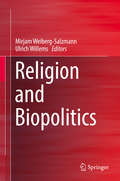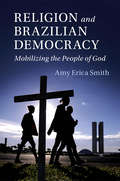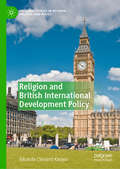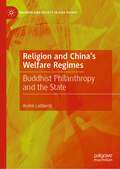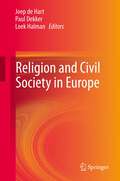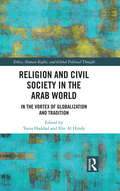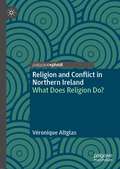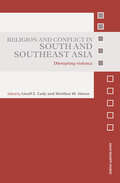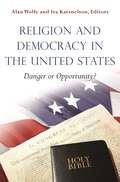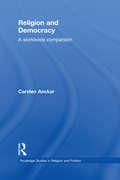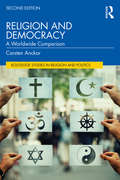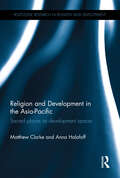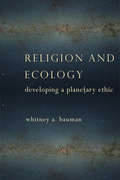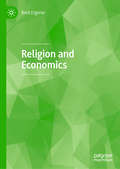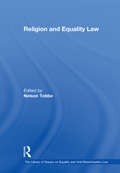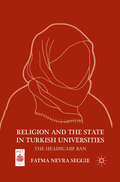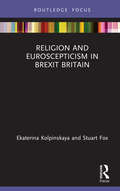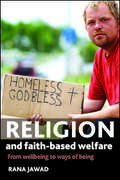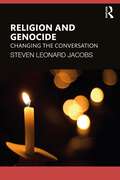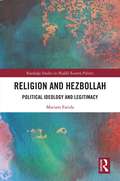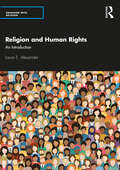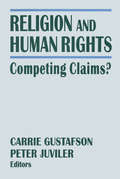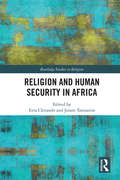- Table View
- List View
Religion and Authoritarianism
by Karrie J. KoeselThis book provides a rare window into the micropolitics of contemporary authoritarian rule through a comparison of religious-state relations in Russia and China - two countries with long histories of religious repression, and even longer experiences with authoritarian politics. Drawing on extensive fieldwork in multiple sites in these countries, this book explores what religious and political authority want from one another, how they negotiate the terms of their relationship, and how cooperative or conflicting their interactions are. This comparison reveals that while tensions exist between the two sides, there is also ample room for mutually beneficial interaction. Religious communities and their authoritarian overseers are cooperating around the core issue of politics - namely, the struggle for money, power, and prestige - and becoming unexpected allies in the process.
Religion and Biopolitics
by Ulrich Willems Mirjam Weiberg-SalzmannGiven the profound moral-ethical controversies regarding the use of new biotechnologies in medical research and treatment, such as embryonic research and cloning, this book sheds new light on the role of religious organizations and actors in influencing the bio-political debates and decision-making processes. Further, it analyzes the ways in which religious traditions and actors formulate their bio-ethical positions and which rationales they use to validate their positions. The book offers a range of case studies on fourteen Western democracies, highlighting the bio-ethical and political debates over human stem cell research, therapeutic and reproductive cloning, and pre-implantation genetic diagnosis. The contributing authors illustrate the ways in which national political landscapes and actors from diverse and often fragmented moral communities with widely varying moral stances, premises and commitments formulate their bio-ethical positions and seek to influence political decisions.
Religion and Brazilian Democracy: Mobilizing the People of God (Cambridge Studies in Social Theory, Religion and Politics)
by Amy Erica SmithAs Brazilian democracy faces a crisis of legitimacy, political divisions grow among Catholic, evangelical, and non-religious citizens. What has caused religious polarization in Brazilian politics? Does religious politics shore up or undermine democracy? Religion and Brazilian Democracy: Mobilizing the People of God uses engaging anecdotes and draws on a wealth of data from surveys and survey experiments with clergy, citizens, and legislators, to explain the causes and consequences of Brazil's 'culture wars'. Though political parties create culture war conflict in established democracies, in Brazil's weak party system religious leaders instead drive divisions. Clergy leverage legislative and electoral politics strategically to promote their own theological goals and to help their religious groups compete. In the process, they often lead politicians and congregants. Ultimately, religious politics pushes Brazilian politics rightward and further fragments parties. Yet Religion and Brazilian Democracy also demonstrates that clergy-led politics stabilizes Brazilian democracy and enhances representation.
Religion and British International Development Policy (Palgrave Studies in Religion, Politics, and Policy)
by Aikande Clement KwayuThis book studies the relationship between British government and faith groups in its international development agenda within and beyond the context of Brexit. It includes aspects of International Relations, International Development, and Religion and Politics to trace the relationship between the British government and faith groups, showing that the relationship is enhanced on three conditions: (i) the resurgence of religion in international affairs; (ii) the attitudes of politicians and political parties towards the third sector (i.e. voluntary and private sectors); and (iii) the rising prominence of the international development agenda in British politics. The third condition triggers the need to understand this relationship in the wake of Brexit. Thus, the book aims to analyze to what extent the increasing prominence of an international development agenda in British politics explains the relationship between the government and faith groups, and ultimately whether Brexit has increased the prominence of international development agenda and brought faith groups into closer relations with the government.
Religion and China's Welfare Regimes: Buddhist Philanthropy and the State (Religion and Society in Asia Pacific)
by André LalibertéThis book presents the welfare regime of China as a liminal space where religious and state authorities struggle for legitimacy as new social forces emerge. It offers a unique analysis of relations between religion and state in the People’s Republic of China by presenting how the Chinese Communist Party (CCP) tries to harness Buddhist resources to assist in the delivery of social services and sheds light on the intermingling of Buddhism and the state since 1949. This book will appeal to academics in social sciences and humanities and broader audiences interested in the social role of religions, charity, NGOs, and in social policy implementation. The author explores why the CCP turns to Buddhist followers and their leaders and presents a detailed view of Buddhist philanthropy, contextualized with an historical overview, a regional comparative perspective, and a review of policy debates. This book contributes to our understanding of secularity in a major non-Western society influenced by religions other than Christianity.
Religion and Civil Society in Europe
by Paul Dekker Loek Halman Joep De HartReligion is back again in Europe after never having been gone. It is manifest in the revival of religious institutions and traditions in former communist countries, in political controversies about the relationship between the church(es) and the state and about the freedom of religion and the freedom to criticize religion, and in public unease about religious minorities. This book is about religion and civil society in Europe. It moves from general theoretical and normative approaches of this relationship, via the examination of national patterns of religion-state relations, to in-depth analyses of the impact of religion and secularization on the values, pro-social attitudes and civic engagement of individuals. It covers Europe from the Lutheran North to the Catholic South, and from the secularized West to the Orthodox East and Islamic South-East with comparative analyses and country studies, concluding with an overall Europe-USA comparison.
Religion and Civil Society in the Arab World: In the Vortex of Globalization and Tradition (Ethics, Human Rights and Global Political Thought)
by Tania Haddad Elie Al HindyThis book examines the links between civil society, religion and politics in the Middle East and North Africa region. The chapters in the volume explore the role of religion in shaping and changing the public sphere in regions that are developing and/or in conflict. They also discuss how these relations are reflected on civil society organizations and the role they are expected to play in transitional periods. This volume: investigates the conceptual dilemmas regarding what is ‘civil society’ in the Arab world today examines the dynamic roles of civil society organizations and religion in the Middle East and North Africa explores the future of the Arab civil society post-‘Arab Spring’ events, and how the latter continues to reshape the demand for democracy in the region. A comprehensive study of how the Arab civil society has come into being and its changing roles, this eclectic work will be of interest to scholars and researchers of politics, especially political Islam, international relations, Middle East Studies, African Studies, sociology and social anthropology.
Religion and Conflict in Northern Ireland: What Does Religion Do?
by Véronique AltglasNorthern Ireland presents a fundamental challenge for the sociology of religion – how do religious beliefs, attitudes and identities relate to practices, violence and conflict? In other words, what does religion do?These interrogations are at the core of this book. It is the first critical and comprehensive review of the ways in which the social sciences have interpreted religion’s significance in Northern Ireland. In particular, it examines the shortcomings of existing interpretations and, in turn, suggests alternative lines of thinking for more robust and compelling analyses of the role(s) religion might play in Northern Irish culture and politics.Through, and beyond, the case of Northern Ireland, the second objective of this book is to outline a critical agenda for the social study of religion, which has theoretical and methodological underpinnings. Finally, this work engages with epistemological issues which never have been addressed as such in the Northern Irish context: how do conflict settings affect the research undertaken on religion, when religion is an object of political and violent contentions? By analysing the scope for objective and critical thinking in such research context, this critical essay intends to contribute to a sociology of the sociology of religion.
Religion and Conflict in South and Southeast Asia: Disrupting Violence (Asian Security Studies)
by Linell E. Cady Sheldon W. SimonA major new contribution to comparative and multidisciplinary scholarship on the alignment of religion and violence in the contemporary world, with a special focus on South and Southeast Asia. Religion and Conflict in South and Southeast Asia shows how this region is the site of recent and emerging democracies, a high degree of religious pluralism, the largest Muslim populations in the world, and several well-organized terrorist groups, making understanding of the dynamics of religious conflict and violence particularly urgent. By bringing scholars from religious studies, political science, sociology, anthropology and international relations into conversation with each other, this volume brings much needed attention to the role of religion in fostering violence in the region and addresses strategies for its containment or resolution. The dearth of other literature on the intersection of religion, politics and violence in contemporary South and Southeast Asia makes the timing of this book particularly relevant. This book will of great interest to advanced undergraduate and postgraduate students of Asian politics, security studies and conflict studies.
Religion and Democracy in the United States: Danger or Opportunity?
by Alan Wolfe and Ira Katznelson EditorsThe United States remains a deeply religious country and religion plays an inextricably critical role in American politics. Controversy over issues such as abortion is fueled by opposition in the Catholic Church and among conservative Protestants, candidates for the presidency are questioned about their religious beliefs, and the separation of church and state remains hotly contested. While the examination of religion's influence in politics has long been neglected, in the last decade the subject has finally garnered the attention it deserves. In Religion and Democracy in the United States, prominent scholars consider the ways Americans understand the relationship between their religious beliefs and the political arena. This collection, a work of the Task Force on Religion and American Democracy of the American Political Science Association, thoughtfully explores the effects of religion on democracy and contemporary partisan politics. Topics include how religious diversity affects American democracy, how religion is implicated in America's partisan battles, and how religion affects ideas about race, ethnicity, and gender. Surveying what we currently know about religion and American politics, the essays introduce and delve into the range of current issues for both specialists and nonspecialists. In addition to the editors, the contributors are Allison Calhoun-Brown, Rosa DeLauro, Bette Novit Evans, James Gibson, John Green, Frederick Harris, Amaney Jamal, Geoffrey Layman, David Leal, David Leege, Nancy Rosenblum, Kenneth Wald, and Clyde Wilcox.
Religion and Democracy: A Worldwide Comparison (Routledge Studies in Religion and Politics)
by Carsten AnckarThis important new study empirically assesses the relationship between religion and democracy, looking at the global, regional and individual country picture. Using a wide range of quantitative data, Anckar tests the validity of Huntington’s claim that democracy and religion are tightly connected, and that western Christianity is the only religion capable of supporting democratic institutions. Anckar evaluates both the broader assumptions that the introduction and the stability of a democratic form of government is dependent on the dominating religion in the country at the macro level and the suggestion that at the individual level, religious adherence is related to pro-democratic values. The volume discusses how whilst at first sight Huntington’s theory appears to receive widespread support, on closer evaluation; there data reveals anomalies that merit further discussion. Whilst it appears that Christianity does seem to provide the most supportive environment democracy, Buddhist countries appear to have results similar to those where Islam is the predominant religion. The relationship between Islam and democracy is also subjected to an extensive discussion; key findings such as the fact that democracy seems to have the greatest chances of success in Muslim countries situated far from Mecca and Medina are developed and examined with important new conclusions reached. Examining religions including Christianity, Islam Buddhism, Hinduism, Chinese folk religion, Confucianism, Taoism and Judaism, Anckar seeks to demonstrate that the political context is more important than religious affiliation for explaining attitudes towards democracy. Thus, at least from the individual perspective, religion is unimportant as an explanation for democratic values. In contrast to Huntington’s predictions, the results of this study will show that the future of democracy does not look so gloomy after all.
Religion and Democracy: A Worldwide Comparison (Routledge Studies in Religion and Politics)
by Carsten AnckarThis fully updated new edition empirically assesses the relationship between religion and democracy, looking at global, regional, and individual countries’ perspectives. Using a wide range of quantitative data, the author tests the validity of Huntington's claim that democracy and religion are tightly connected, and that western Christianity is the only religion capable of supporting democratic institutions. He evaluates both the broader assumptions that the introduction and the stability of a democratic form of government is dependent on the dominating religion in the country at the macro level, and the suggestion that, at the individual level, religious adherence is related to pro-democratic values. Examining religions including Christianity, Islam, Buddhism, Hinduism, Chinese folk religion, and Judaism, this book demonstrates that geographical and political contexts are more important than religious affiliation for explaining levels of, and attitudes towards, democracy. As well as offering a broad empirical picture of the relationship between religion and democracy, this new edition delves deeper into the religion–state nexus, focusing particularly on events that have taken place during the last decade. The author explores how religion is used instrumentally by political leaders in different parts of the world. He also discusses the extent to which religious minorities are under increasing pressure in secularized environments; prospects for democracy in the MENA region a decade after the Arab Spring; the growing influence of evangelical Christianity in Latin America; and how increasing levels of religious conflict in Asia and the Pacific as well as in Sub-Saharan Africa pose a threat to the emergence and survival of democracy. This book will be of great interest to students, academics, and researchers within the field of comparative politics, as well as journalists and various theological associations.
Religion and Development in the Asia-Pacific: Sacred places as development spaces (Routledge Research in Religion and Development)
by Matthew Clarke Anna HalafoffCommunity development is most effective and efficient when it is situated and led at the local level and considers the social behaviours, needs and worldviews of local communities. With more than eight out of ten people globally self-reporting religious belief, Religion and Development in the Asia-Pacific: Sacred places as development spaces argues that the role and impact of religions on community development needs to be better understood. It also calls for greater attention to be given to the role of sacred places as sites for development activities, and for a deeper appreciation of the way in which sacred stories and teachings inspire people to work for the benefit of others in particular locations. The book considers theories of ‘place’ as a component of successful development interventions and expands this analysis to consider the specific role that sacred places – buildings and social networks – have in planning, implementing and promoting sustainable development. A series of case studies examine various sacred places as sites for development activities. These case studies include Christian churches and disaster relief in Vanuatu; Muslim shrines and welfare provision in Pakistan; a women’s Buddhist monastery in Thailand advancing gender equity; a Jewish aid organisation providing language training to Muslim Women in Australia; and Hawaiian sacred sites located within a holistic retreat centre committed to ecological sustainability. Religion and Development in the Asia-Pacific demonstrates the important role that sacred spaces can play in development interventions, covering diverse major world religions, interfaith and spiritual contexts, and as such will be of considerable interest for postgraduate students and researchers in development studies, religious studies, sociology of religion and geography.
Religion and Ecology: Developing a Planetary Ethic
by Whitney BaumanMoving beyond identity politics while continuing to respect diverse entities and concerns, Whitney A. Bauman builds a planetary politics that better responds to the realities of a pluralistic world. Calling attention to the historical, political, and ecological influences shaping our understanding of nature, religion, humanity, and identity, Bauman collapses the boundaries separating male from female, biology from machine, human from more than human, and religion from science, encouraging readers to embrace hybridity and the inherent fluctuations of an open, evolving global community.As he outlines his planetary ethic, Bauman concurrently develops an environmental ethic of movement that relies not on place but on the daily connections we make across the planet. He shows how both identity politics and environmental ethics fail to realize planetary politics and action, limited as they are by foundational modes of thought that create entire worlds out of their own logic. Introducing a postfoundational vision not rooted in the formal principles of "nature" or "God" and not based in the idea of human exceptionalism, Bauman draws on cutting-edge insights from queer, poststructural, and deconstructive theory and makes a major contribution to the study of religion, science, politics, and ecology.
Religion and Economics
by Resit ErgenerThis book allows the reader to have an overview of the relations between religion and economics throughout history. It starts with the beginnings of early modern humans, when dreams (of dead ancestors), animism, synchronous movements and a propensity to exchange, led to the emergence of religion, which then contributed to the coordination and pooling of labor and to the definition of groups. This book surveys the various roles played by religion in economic life through the ages, which include the justification of the exploitation of nature, the expansion of trade, the emergence of inequality and of charity, the definition, enhancement and attenuation of hierarchies of dominance, the provision of various services and of the impact religion has had on economic performance at the micro and macro levels.
Religion and Equality Law (The\library Of Essays On Equality And Anti-discrimination Law Ser.)
by Nelson TebbeThe essays selected for this volume address topics at the intersection of religion and equality law, including discrimination against religion, discrimination by religious actors and discrimination in favor of religious groups and traditions. The introduction provides a conceptual guide to these types of inequality - which are often misunderstood or conflated - and it offers an analysis of different species of discrimination within each broad category. Each section of the volume contains both theoretical essays, which set out frameworks for thinking about the relevant type of inequality, and essays that examine real-world disputes. For example, the articles address the conflicts over headscarf laws in France and Turkey, the place of so-called traditional religions in Africa, the display of Roman Catholic crucifixes in Italian classrooms, and the ability of American religious organizations to be free of employment laws in their treatment of clergy. This volume brings together classic articles which are otherwise difficult to access, enables students to study key articles side-by-side, and provides instructors with a valuable teaching resource.
Religion and Ethics in a Globalizing World: Conflict, Dialogue, and Transformation (Middle East Today)
by Luca Anceschi Joseph Anthony Camilleri Ruwan Palapathwala Andrew WickingThis book explores educational and cultural experiences of 'part-time' unveilers during their undergraduate degree programs in public institutions in Turkey. The term 'part-time unveiler' refers to undergraduate female students who cover their hair in their private lives but who remove the headscarf while at a Turkish university.
Religion and Euroscepticism in Brexit Britain (Routledge Focus on Religion)
by Stuart Fox Ekaterina KolpinskayaReligion has a significant effect on how Europeans feel about the European Union (EU) and has had an important impact on how people voted in the UK’s ‘Brexit referendum’. This book provides a clear and accessible quantitative study of how religion affects Euroscepticism and political behaviour. It examines how religion has affected support for EU membership since the UK joined the European Economic Community, through to the announcement of the Brexit referendum in 2013, to the referendum itself in 2016. It also explores how religion continues to affect attitudes towards the EU post-Brexit. The volume provides valuable insights into why the UK voted to leave the EU. Furthermore, it highlights how religion affects the way that citizens throughout Europe assess the benefits, costs and values associated with EU membership, and how this may influence public opinion regarding European integration in the future. This timely book will be of important interest to academics and students focusing on religion and public attitudes, contemporary European and British politics as well as think tanks, interest groups and those with an interest in understanding Brexit.
Religion and Faith-Based Welfare: From Wellbeing to Ways of Being
by Rana JawadThis original book makes a timely and potentially controversial contribution both to the teaching of social policy and the wider debates surrounding it in Britain today. It offers a critical and theoretically sensitive overview of the role of religious values, actors and institutions in the development of state and non-state social welfare provision in Britain, combining historical discussion of the relationship between religion and social policy in Britain with a comparative theoretical discussion that covers continental Europe and North America. Grounded in new empirical research on religious welfare organisations from the nine major faiths in the UK, the book brings together all of these perspectives to argue for an analytical shift in the definition of wellbeing through a new concept called 'ways of being'. This reflects the moral, ideational and cultural underpinnings of social welfare. Written in a readable style, the book will appeal to students and tutors of social policy, as well as policy-makers seeking to inform themselves about the key issues surrounding faith-based welfare in modern Britain.
Religion and Freedom of Thought
by Reinhold Niebuhr Perry Miller Robert L. Calhoun Nathan M. Pusey Henry P. Van DusenWritings on this subject by scholars.
Religion and Genocide: Changing the Conversation
by Steven Leonard JacobsReligion and Genocide: Changing the Conversation is a cutting-edge introduction to the complex and controversial relationship between religion and genocide. This book aims to widen the reader’s understanding of religion and those who practice it, the nexus of religion and violence, and those who legitimate their violence by framing it in religious terms by looking at notions of holy wars, religious wars, and genocide and the practitioners of such. This book delves into our current thinking of ourselves as biological entities, our relationship to genocide, and the impact of geography (including climate change) and diseases on our humanity and our ability to commit genocide. Tying together all these seemingly disparate threads, this text concludes with the significant and still largely unanswered question: "Where do we go from here?". Highlighting the complex relationship between religion and genocide, this is an essential read for students and academics studying religion and violence, Judaism, Judaic studies, and holocaust and genocide studies. Religion and Genocide will also be of interest to researchers in related subjects such as history, politics, sociology, and anthropology.
Religion and Hezbollah: Political Ideology and Legitimacy (Routledge Studies in Middle Eastern Politics)
by Mariam FaridaThis comprehensive and thought-provoking volume examines the role and function of religion in Hezbollah’s political strategy in the context of contemporary Lebanese politics and global security. The book demonstrates how Hezbollah uses religious mechanisms such as taklif shari (religious assessment), ijtihad (interpretation) of jihad, and fatwa (religious verdict) as political tools to mobilise the Shi’a in Lebanon and the Middle East and to build political support. The comprehensive content analysis scrutinised speeches of Hezbollah Secretary General, Hassan Nasrallah, from 2000 to 2013. The results provide and inform a wide-scoping discussion of Nasrallah’s uses of rhetorical devices and context to imbue religious elements into Hezbollah politics to mobilise and motivate supporters. Additionally, a case study analysis of Hezbollah’s intervention in the Syrian conflict is also included. This further demonstrates Hezbollah’s strategic use of political pragmatism and religious rhetoric to link its political and military agendas and to transition the Party from a resistance group in Lebanon to a regional actor with a regional priority. As such, readers are provided with new and interesting insights into Hezbollah’s ideology and identity as a domestic and regional non-state actor, and the social mobilisation of Shi'a in Lebanon and the region. Providing a nexus between religion, politics, and security, the book will be a key resource for students and researchers interested in religious studies and Middle East politics.
Religion and Human Rights: An Introduction (Engaging with Religion)
by Laura E. AlexanderThis book highlights perspectives from religious traditions worldwide, in conversation with other communities who promote, critique, or question the idea of human rights. It shows how human rights can provide a platform for dialogue among groups of people from diverse backgrounds who seek to address pressing issues of human well-being. In each chapter, readers will be introduced to religious and human rights perspectives on specific global issues. Intersecting with these issues, the work examines history and philosophy of human rights, for a generally accessible overview of human rights theory, foundations, and critique. Specific case studies woven through the book will also help both students and advocates – whether they are part of religious communities or not – engage more deeply with particular areas of concern. This volume is a useful resource for undergraduate students who are learning about the relationship between religion and human rights in a classroom for the first time, as well as upper-level and graduate students looking for a broad basis of knowledge and a starting point for digging deeper into specific areas of scholarship.
Religion and Human Rights: Competing Claims? (Columbia University Seminars Ser.)
by Peter Juviler Carrie GustafsonMuch has been written about the issue of religious freedom and church-state relations. The contributors to this book, however, take up another side of the question: what has been the impact of religion on human rights. Representatives from various religious traditions address a broad range of topics, from environmental rights to the basic validation of human rights, to the rights of women in India and Iran and within Orthodox Judaism, to the global imposition of criminal justice, to pressures for democratization within the Catholic Church in Latin America. The six major essays, along with their accompanying "replies" answer questions and raise issues in a provocative and compelling debate.
Religion and Human Security in Africa (Routledge Studies in Religion)
by Ezra Chitando Joram TarusariraAcross diverse countries and contexts in Africa, religion has direct implications for human security. While some individuals and groups seek to manipulate and control through the deployment of religion, religious belief is also a common facet of those working towards peace and reconciliation. Despite the strategic importance of religion to human security in Africa, there are few contemporary publications that explore this issue on an international scale. This volume redresses that imbalance by examining religion’s impact on human security across Africa. Written by an international team of contributors, this book looks in detail at the intersection of religion and security in a variety of African contexts. Case studies from a diverse set of countries including Nigeria, Ghana, South Africa, Burkina Faso, and more, are used to illustrate wider trends across the continent. Acknowledging that religion can be used to incite violence as well as encourage peace, the chapters employ an interdisciplinary exploration of the ethics, sociology, and politics around these issues. This is much needed volume on religion’s capacity to effect human security. It will, therefore, be of significant interest to any scholar of religious studies, African studies, political science, the sociology of religion, and anthropology, as well as peace, conflict, and reconciliation studies.

